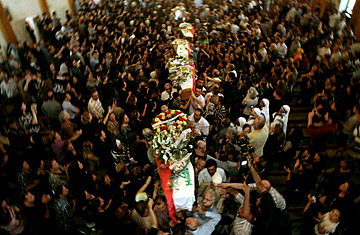
Mourners carry the coffins of slain Christians during their funeral in Baghdad, Nov. 2, 2010
Seraj Abdullah was on the couch watching TV with his young brother and sister when the car bomb went off. It obliterated a tea shop down the block with an explosion so strong that broken glass and debris hit their faces and Abdullah was left temporarily deaf. He stumbled outside in terrified silence and found two of his best friends dead, their body parts scattered amid the carnage. "I just kept thinking," he recalls, "Is it over? What's going to happen now? Who is going to protect us?"
The same questions are echoing all over Baghdad in the aftermath of two days of bloodshed equal to any terrorism the beleaguered city has seen in years. The problem is that nobody seems to know the answers. There's still no new government despite months of bickering and dealing after the inconclusive March elections, there is clearly no security, and for many Iraqis, there is less and less hope. This week's brazen, coordinated massacres have only deepened the public's fear that they are at the mercy of insurgents and regional powers eager for a destabilized Iraq. There is a growing sense in the streets that the situation is getting worse.
The bomb that destroyed the café near Abdullah's house in Baghdad's Almeen district was one of at least 12 explosives-laden vehicles that were detonated almost simultaneously by remote control in mostly Shi'a areas on Tuesday. The Ministry of Health reported 86 dead and more than 360 injured. Security officials have blamed al-Qaeda in Iraq and claimed the terrorist group had support from unnamed regional countries. The U.S. military has been quoted describing the attacks as typical of homegrown al-Qaeda groups.
The day before, gunmen overran a Christian church in the middle-class Karada neighborhood during Sunday services, instantly murdering the attending priest and an acolyte. In the hostage siege that followed, 52 people were killed and 73 wounded when attackers sprayed bullets and set off suicide-bomb vests. Officials said the gunmen were Arabic-speaking foreign nationals. Later, the al-Qaeda-linked Islamic State of Iraq released a statement warning of more attacks against Christians — another devastating blow to Iraq's millennia-old Christian community.
"Just a few weeks ago, the government said security was under control, but it doesn't look that way to me," says Aliya Nsayif, a parliamentarian with the mostly Sunni and secular Iraqiya bloc. "It looks to me and to the public like politicians have abandoned their promises to protect the Iraqi people." After seven years of U.S. military occupation, the security apparatus is now entirely in Iraqi hands, although bolstered by American intelligence and occasional air support.
Analysts worry that Iraq's current security and political dysfunction could prove a liability to the entire region, becoming a deadly breeding ground for terrorist groups with global aspirations. Indeed, this week's attacks could be the emotional catalyst for a government to finally unite after more than eight months of dithering political gridlock. If not, they may be the beginning of a return to the raw violence that made Iraq the most dangerous country on earth.
Iraq's Supreme Court ruled last month that parliament was in violation of the constitution for the delay in forming a government and ordered the lawmakers to reconvene. There is much at stake at the court-ordered legislative session, which will be held Nov. 8. Some say the public's fury over the recent attacks could make the difference between a breakthrough and more disappointment. "I believe the breakdown in security and the fears of returning to the almost daily violence of 2006 and 2007 has turned what was merely an embarrassing political impasse into a moment of crisis for the people, and has consequently awakened the Iraqi political elite," says Jason Gluck, senior rule-of-law adviser for the U.S. Institute of Peace and a former U.N. adviser to Iraq's Council of Representatives. "Whether the goal of the terrorists was to send a message to a particular party or a political personality, or just wanton nihilism, seems to matter less today than an appropriate response from [Iraq's] leaders — first and foremost by forming a government."
Other analysts don't see it happening. Says Joost Hiltermann, Middle East director of the International Crisis Group: "I am far from convinced that the attacks were a game changer, but let's wait and see. They are part of a pattern of such attacks aimed at jump-starting civil war, modeled on the success of similar attempts in 2004 to 2005. Insurgents will be successful only if no government is formed, or if a government emerges that is not inclusive of all of Iraq's main communities." Hiltermann points out, however, that forming a government that placates each of Iraq's different communities, as was the case in 2005, has its drawbacks as well. "An inclusive government could be very good at maintaining security. However, it would not be particularly effective at governing," because divvying up a government among Sunni, Shi'a and Kurdish power brokers could leave the administration as hamstrung as ever as it tries to pass laws, distribute petrodollars and protect its citizens.
As parliament prepares to meet in the wake of this week's tragedies, Iraqis like Abdullah are left to sift through the destruction and consider how secure the future may be. Says Abdullah: "We are living in hell."
McDermid is an editor with the Institute of War and Peace Reporting in Iraq.
